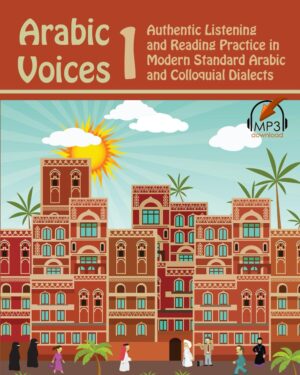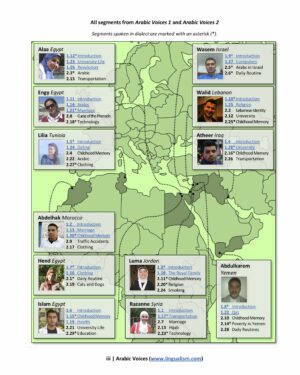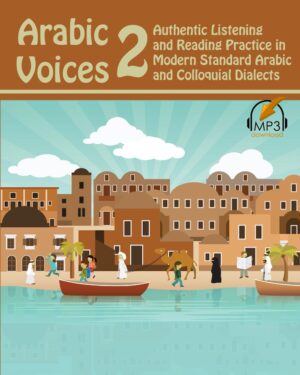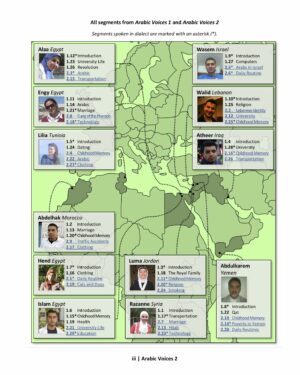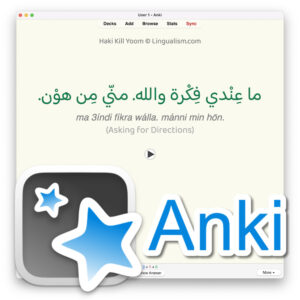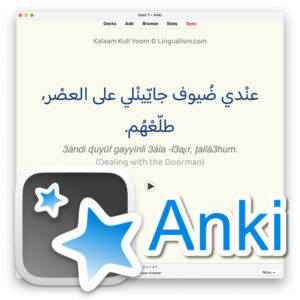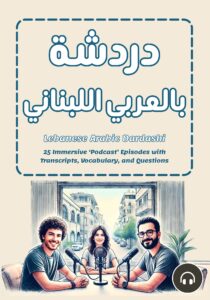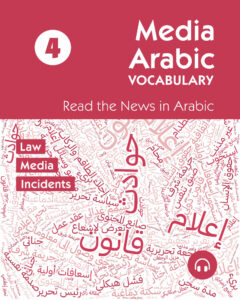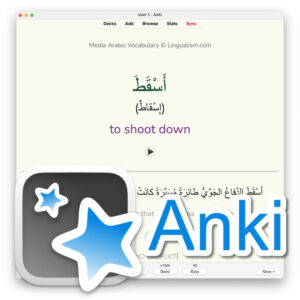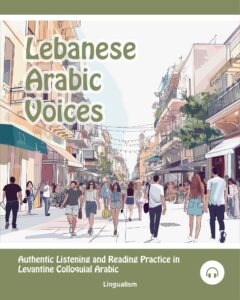🎉BLACK FRIDAY SALE! 🛍️SAVE 25% for a limited time. Use coupon code BLACK24 at checkout. Sale ends November 30, 2024.
Home » Modern Standard Arabic » Abdelhak’s Self-Introduction
Abdelhak’s Self-Introduction
| Greetings! [00:00] | السلام عليكم ورحمة الله وبركاته. | |
| Hello and welcome again to a video for Arabic Voices, your path to learning Arabic. [00:03] | أهلًا ومرحبًا بكم مرة أخرى في فيديو من فيديوهات Arabic Voices طريقك لتعلم العربية. | |
| Last time, we spoke about what Razanne said about her life in America. [00:11] | كنا قد تحدثنا في المرة السابقة عمّا قالته رزان بشأن حياتها في أمريكا، | |
| Today we will talk about what Abdelhak said, we will explain some different concepts and terms, [00:18] | واليوم سنتحدث عمّا قاله عبد الحق، وسنقوم بشرح بعض المفاهيم والمصطلحات المختلفة، | |
| and we will mention some synonyms for the words used by Abdelhak while he was talking. [00:26] | كما سنقوم بذكر بعض المرادفات للكلمات التي استخدمها عبد الحق أثناء حديثه. | |
| Let's begin with the first line on page 7. [00:33] | فهيّا بنا نبدأ بالسطر الأول في الصفحة السابعة. | |
| Abdelhak says, "My name is Abdelhak. I live in the city of Sidi Bennour in the province of El Jadida." [00:38] | يقول عبد الحق: (اسمي عبد الحق، وأقطُن بمدينة سيدي بنور بمحافظة الجديدة). | |
| Abdelhak uses the verb 'أقطُن' to express his residence. He says, "I reside in the city of Sidi Bennour." [00:46] | يستخدم عبد الحق هنا الفعل [أقطُن] للتعبير عن السكن، فيقول: (وأقطُن بمدينة سيدي بنور). | |
| You can also use the verb [أسكن بِـ] instead of [أقطُن بِـ]. You can say, "وأسكن بمدينة سيدي بنور". [00:56] | يمكنك كذلك أن تستخدم الفعل [أسكن بِـ] بدلًا من [أقطُن بِـ]، فيمكنك أن تقول: (وأسكن بمدينة سيدي بنور). | |
| You can also use the verb أُقيم. "I live in the city of Sidi Bennour." [01:07] | كما يمكنك أن تستخدم الفعل [أُقيم]؛ (أُقيم بِمدينة سيدي بنور). | |
| So any of the verbs: أبطُن or أسكن or أقيم. [01:16] | فالفعل [أقطُن بِـ]، (أسكن بِـ)، (أُقيم بِـ) أي... | |
| With any of them, you can use to express your residence or where you live. [01:21] | أيًا منهما يمكنك استخدامه للتعبيرعن السكن أو المكان الذي تقيم به. | |
| But remember to use the preposition بِـ. You must use بِـ after these verbs. [01:30] | ولكن عليك أن تتذكر استخدام حرف الجر [بِـ]، فلا بُد من استخدام [الباء] بعد أي من هذه الأفعال. | |
| This is the first verb that Abdelhak uses. [01:42] | فهذا عن الفعل الأول الذي استخدمه عبد الحق. | |
| on line 4, Abdelhak says, "His job is, in fact, quite hard." [01:47] | في السطر الرابع يقول عبد الحق: (في حقيقة الأمر، عمله صعبٌ جدًا). | |
| Abdelhak begins here using the expression "في حقيقة الأمر" (in fact). You can use this expression if you want to pave the way to talk about your opinion. [01:55] | ويبدأ عبد الحق هنا حديثه باستخدام مصطلح [في حقيقة الأمر]، وهذا المصطلح يمكنك أن تستخدمه إذا أردت أن تمهد للحديث عن رأيك. | |
| You want to express your opinion candidly, so you use the term "في حقيقة الأمر". [02:08] | فأنت تريد أن تدخل رأيك بصراحة فتستخدم المصطلح [في حقيقة الأمر]. | |
| You can also say "في الحقيقة" or "بصراحة", and this is what Abdelhak later used on line 6 when he said: "بصراحة، أنا أكره عملي" (To be honest, I hate his job.) [02:19] | يمكنك كذلك أن تقول [في الحقيقة]، يمكنك أن تقول [بصراحة] وهذا ما استخدمه عبد الحق لاحقًا في السطر السادس عندما قال: (بصراحة، أنا أكره عمله). | |
| So... "في حقيقة الأمر" or "في الحقيقة" or "بصراحة". You can use any of these terms to express or to preface... [02:31] | ف... [في حقيقة الأمر]، [في الحقيقة]، [بصراحة]، يمكنك استخدام أيًا من هذه المصطلحات للتعبير أو للتمهيد عن... | |
| To preface... to express your opinion very candidly! [02:42] | للتمهيد، للتعبير عن رأيك بصراحة. | |
| Excellent! Let's move on to what Abdelhak said on line 7. [02:48] | عظيم! هيا بنا ننتقل إذًا إلى ما قاله عبد الحق في السطر السابع، | |
| We mentioned the previous video about using the masdar, and how the masdar should be used after certain verbs, whether it be a "real" masdar or an "interpreted" masdar. [02:57] | وكنا قد ذكرنا المرة السابقة استخدام [المصدر]، وكيف أنه لا بدّ أن تستخدم [المصدر] بعد بعض الأفعال سواء ما كان [المصدر الصريح] أو [المصدر المؤول]. | |
| As a quick reminder of what we said last time, on line 7, Abdelhak says, "That's why I decided to go to college." Here, Abdelhak uses the masdar "الذهاب" (going) after the verb "قررت" (I decided). [03:13] | تذكرة سريعة بما قلناه المرة السابقة، في السطر السابع يقول عبد الحق: (لذلك قررت الذهاب إلى الجامعة)، فيستخدم عبد الحق هنا المصدر [الذهاب] بعد الفعل [قررت]. | |
| The verb قررت (I decided) is a verb that must be followed by a masdar, whether it be a true masdar, like الذهاب, or you can also use an interpreted masdar. "I decided to go to university." [03:32] | الفعل [قررت] هو من أحد الأفعال التي لا بد أن تلحقها [بالمصدر] سواء ما كان [المصدر الصريح] مثل [الذهاب]، أو يمكنك كذلك أن تستخدم [المصدر المؤول]، فتقول: (قررت أن أذهب إلى الجامعة). | |
| So, add this verb to verbs that must be followed by a masdar. [03:51] | فأضف هذا الفعل إلى الأفعال التي لا بدّ أن تُلحَق بالمصدر. | |
| Excellent! Then we go to what Abdelhak said on line 12. "I have written many articles and investigations… I have written many articles and investigations." Abdelhak uses the verb here. The mean means [stop]. [03:59] | عظيم! هيّا بعد ذلك ننتقل إلى ما قاله عبد الحق في السطر الثاني عشر—فيقول عبد الحق: (قمت بكتابة العديد من المقالات والتحقيقات… قمت بكتابة العديد من المقالات والتحقيقات)، فيستخدم عبد الحق هنا الفعل [قُمت بِـ]، والفعل [قام] وحده بدون الباء يعني [وقف]. | |
| You say, "So and so stood up; Ahmed stood up; he stood up; Ahmed stood up, Ahmed stood up." [04:32] | تقول (قام فُلان، قام أحمد)، فهو وقف؛ وقف أحمد، قام أحمد. | |
| But if you use the preposition بِـ with the verb قام, it means something else: standing or whatever action. [04:38] | ولكن إن استخدمت الحرف: حرف [ الباء]، مع الفعل [قام] فهو يعني أمر آخر وهو القيام أو فعل أمرٍ ما. | |
| I wrote many articles; that is, I did this action, I did, I wrote these articles... or wrote articles. [04:51] | فقمت بِكتابة العديد من المقالات أي فعلتُ هذا الأمر، فعلتُ، كتبتُ هذه المقالات، أو كتبتُ المقالات. | |
| When you use قُمتُ بِـ this verb with an action, you are doing something. [05:03] | فعندما تستخدم [قُمتُ بِـ] هذا الفعل مع حرف الجر، يعني أنك تقوم بأداء أمرٍ ما. | |
| You can say "I wrote a lot of articles." [05:13] | يمكنك أن تقول: (قمت بكتابة الكثير من المقالات، قمت بدراسة هذه... | |
| "I studied this book", and so on. [05:20] | قمت بدراسة هذا الكتاب)، وهكذا. | |
| "I studied Arabic, I planned the project", and so on. [05:25] | (قمت بدراسة اللغة العربية، قمت بِالتخطيط للمشروع)، وهكذا. | |
| So, قمت بِـ is an act you can use to express an action or perform a task. [05:32] | فـ[قمت بِـ] هو فعل يمكنك أن تستخدمه للتعبير عن فعل أو أداء مهمةٍ ما. | |
| Great! After that, Abdelhak says on line 20, "My wife is considered to be my life companion." Life companion. [05:41] | عظيم! بعد ذلك، يقول عبد الحق في السطر العشرون: (تُعتبر زوجتي رفيقة دربي)، [رفيقة دربي]. | |
| This is a term that you mean or use to refer to someone who is very close to you. He or she is close to you. Whether you are a husband or wife or a close friend; someone who spends most of their time with you, who thinks like you, for example, or you are very close. [05:55] | وهذا مصطلح يعني أو تستخدمه للإشارة إلى شخصٍ مقرب منك جدًا، وهو ملازم لك سواء ماكان زوج أو زوجة أو صديق مقرب جدًا، يعني غالبًا ما يقضي معك معظم أوقاتك، وهو يفكر مثلًا مثلك أو أنتم قريبون جدًا من بعض. | |
| Here Abdelhak uses رفيقة دربي, meaning that she is vital to him and she helps him a lot and he... she is very close to him. [06:20] | فهنا يستخدم عبد الحق [رفيقة دربي]، يعني أنها ملازمة له وأنها تساعده كثيرًا وهو... هي مقربةً جدًا منه. | |
| You can use this to refer to a husband or wife, or you can also use them to refer to a friend who is very close to you. [06:34] | يمكنك أن تستخدم هذا للإشارة إلى زوج أو زوجة، أو يمكنك كذلك أن تستخدمها للإشارة إلى صديق مقرب جدًا منك. | |
| Great! رفيقة دربي, or you can say in the masculine رفيق دربي. [06:45] | عظيم! [رفيقة دربي]، أو كذلك يمكنك أن تقول للمذكر [رفيق دربي]. | |
| Great! Then, on line 25... on line 25, Abdelhak says, "Besides soccer, I love writing, reading and drawing". [06:54] | عظيم! بعد ذلك، في السطر الخامس والعشرون... في السطر الخامس والعشرون، يقول عبد الحق: (بالإضافة إلى كرة القدم، أحب الكتابة والقراءة والرسم). | |
| Here Abdelhak uses the term بالإضافة إلى to refer to other things he likes, or for additional information. [07:11] | فهنا يستخدم عبد الحق مصطلح [بالإضافة إلى] للإشارة إلى أمور أخرى هو يحبها، أو للإضافة. | |
| In addition, you can use بالإضافة إلى and you can also use بجانب. [07:23] | فللإضافة يمكنك أن تستخدم [بالإضافة إلى] كما يمكنك كذلك أن تستخدم [بجانب]. | |
| Besides soccer, I love writing, reading and drawing. [07:32] | (بالإضافة إلى كرة القدم، أحب الكتابة والقراءة والرسم)؛ (بجانبِ كرة القدم، أحب الكتابة والقراءة والرسم). | |
| Note that when you use بجانب, do not use the preposition إلى. Besides soccer, I love writing, reading and drawing. [07:43] | ولاحظ أنك عندما تستخدم [بجانب] لا تستخدم حرف الجر [إلى]، (بجانب كرة القدم، أحب الكتابة والقراءة والرسم). | |
| Wonderful! This is another term you can use along with the word... or the term بالإضافة إلى. [07:55] | عظيم! فهذا مصطلح آخر يمكنك أن تستخدمه إلى جانب كلمة... أو مصطلح [بالإضافة إلى]. | |
| You can also use بجانب. [08:04] | يمكنك كذلك أن تستخدم [بجانب]. | |
| In the end, we want to talk about what Abdelhak said on line 27. [08:09] | في النهاية نريد أن نتحدث عمّا قاله عبد الحق في السطر السابع والعشرون. | |
| Abdelhak says, "It helps me to feel lively and active." Abdelhak uses the verb يساعد here. [08:17] | يقول عبد الحق: (تساعدني على الشعور بالحيوية والنشاط)، ويستخدم عبد الحق هنا الفعل [يساعد]. | |
| "It helps me to feel lively and active." And as you have noticed, you have to use the preposition على with the verb يساعد. So, something helps you with something. [08:28] | (تساعدني على الشعور بالحيوية والنشاط)، وكما لاحظت، لابدّ أن تستخدم مع الفعل [يساعد] حرف الجر [على]؛ (فشيئًا ما يُساعدُك على أمرٍ ما). | |
| The... He finds great fun in writing because it helps him to feel lively and active." تساعده على. [08:46] | ال... هو يجد متعة كبيرة في الكتابة، لأنها تساعده على الشعور بالحيوية والنشاط؛ [تساعده على]. | |
| You can say, "Reading helps me learn." [08:56] | يمكنك أن تقول: (القراءة تساعدني على التعلم). | |
| You can say, "This book helps me to learn Arabic." [09:02] | يمكنك أن تقول: (هذا الكتاب يساعدني على تعلم العربية). | |
| As you have noticed, after using يساعد على or تساعد على, we use a masdar, so you'd say تساعدني... or as Abdelhak says, "It helps me feel rejuvenated." [09:08] | وكما لاحظت بعد استخدام [يساعد على] أو [تساعد على]، نستخدم المصدر، فتقول [تساعدني] أو كما يقول عبد الحق (تساعدني على الشعور بالحيوية). | |
| You can say "writing help me to practice language", [practice language]. [09:23] | يمكنك أن تقول (الكتابة تساعدني على ممارسة اللغة)، [ممارسة اللغة]. | |
| "Reading helps me learn." [09:31] | (القراءة تساعدني على التعلم)، [التعلم]. | |
| After using تساعد على or يساعد على, we use a masdar. [09:36] | فبعد استخدام [تساعد على] أو [يساعد على]، نستخدم المصدر. | |
| And with this, we have finished commenting on what Abdelhak said. [09:43] | وبهذا، نكون قد انتهينا من التعليق عمّا قاله عبد الحق. | |
| I hope you have benefited from this video, and I will see you in another video soon. [09:48] | أتمنى أن تكونوا قد استفدتم من هذا الفيديو، و سألقاكم في فيديو آخر قريبًا. | |
| Thank you very much for your kind attention. May peace and God's mercy and blessings be upon you. [09:55] | أشكركم شكرًا جزيلًا لحسن استماعكم، والسلام عليكم ورحمة الله وبركاته. |
Video Lessons
Arabic Voices MSA Lessons
Arabic teacher Mostafa Ahmed takes us through segments in MSA from Lingualism's book Arabic Voices 1: Authentic Listening and Reading Practice in Modern Standard Arabic and Colloquial Dialects, explaining interesting points of grammar and vocabulary.

